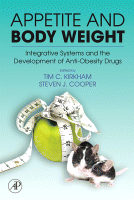Browse content
Table of contents
Actions for selected chapters
- Full text access
- Book chapterAbstract only
Chapter 1 - Introduction and Overview
Steven J. Cooper and Tim C. Kirkham
Pages 1-4 - Book chapterAbstract only
Chapter 2 - Cortical Systems Involved in Appetite and Food Consumption
Morten L. Kringelbach
Pages 5-I - Book chapterAbstract only
Chapter 3 - The Nucleus Accumbens Shell as a Model of Integrative Subcortical Forebrain Systems Regulating Food Intake
Thomas R. Stratford
Pages 27-65 - Book chapterAbstract only
Chapter 4 - Hypothalamic Neuropeptides and Feeding Regulation
Bernard Beck
Pages 67-98 - Book chapterAbstract only
Chapter 5 - Brainstem-Hypothalamic Neuropeptides and the Regulation of Feeding
Simon M. Luckman
Pages 99-141 - Book chapterAbstract only
Chapter 6 - The Gut-Brain Axis in the Control of Eating
Thomas A. Lutz and Nori Geary
Pages 143-166 - Book chapterAbstract only
Chapter 7 - Integration of Peripheral Adiposity Signals and Psychological Controls of Appetite
Dianne Figlewicz Lattemann, Nicole M. Sanders, ... Alfred J. Sipols
Pages 167-190 - Book chapterAbstract only
Chapter 8 - Brain Reward Systems for Food Incentives and Hedonics in Normal Appetite and Eating Disorders
Kent C. Berridge
Pages 191-II - Book chapterAbstract only
Chapter 9 - Pharmacology of Food, Taste, and Learned Flavor Preferences
Steven J. Cooper
Pages 217-245 - Book chapterAbstract only
Chapter 10 - The Role of Palatability in Control of Human Appetite: Implications for Understanding and Treating Obesity
Martin R. Yeomans
Pages 247-269 - Book chapterAbstract only
Chapter 11 - Learned Influences on Appetite, Food Choice, and Intake: Evidence in Human Beings
E.L. Gibson and J.M. Brunstrom
Pages 271-300 - Book chapterAbstract only
Chapter 12 - Gene environment Interactions and the Origin of the Modern Obesity Epidemic: A Novel “Nonadaptive Drift” Scenario
John R. Speakman
Pages 301-322 - Book chapterAbstract only
Chapter 13 - Preclinical Developments in Antiobesity Drugs
Steven P. Vickers and Sharon C. Cheetham
Pages 323-336 - Book chapterAbstract only
Chapter 14 - Clinical Investigations of Antiobesity Drugs
John Wilding
Pages 337-III - Book chapterNo access
Index
Pages 357-371
About the book
Description
There is now enough basic work to sketch out the principal systems at all levels of the brain, from prefrontal cortex to lower brainstem, which are orchestrated to provide control of food selection, preference and consumption. At the same time, the complex interplay between central systems and signals generated from peripheral systems include the gut, liver and fat stores, as well as the interactions with the neuroendocrine system can be described in some detail. A continuing theme throughout the book is that the functional analysis of appetite and food intake cannot be limited to a single focus, e.g. hypothalamic neuropeptides and their interactions, but must be based on a fully integrated view of the several contributing systems.
Appetite and Body Weight: Integrative Systems and the Development of Anti-Obesity Drugs provides an expert guide to the neural, neurochemical, autonomic and endocrine interrelations which underpin appetite and the controls of food intake and body weight. The book covers many of the neurochemical entities that are currently under investigation, including: neuropeptides, leptin, insulin, monoamines and endogenous cannabinoids in relation to appetite and body-weight control. In addition to the neuroscience analysis, there are also chapters that provide an expert guide to some of the key psychological concepts that the researchers believe are essential in trying to understand the phenomena under investigation. The volume will also serve as an authoritative guide to the current emphasis on the development of novel, efficacious anti-obesity medication.
There is now enough basic work to sketch out the principal systems at all levels of the brain, from prefrontal cortex to lower brainstem, which are orchestrated to provide control of food selection, preference and consumption. At the same time, the complex interplay between central systems and signals generated from peripheral systems include the gut, liver and fat stores, as well as the interactions with the neuroendocrine system can be described in some detail. A continuing theme throughout the book is that the functional analysis of appetite and food intake cannot be limited to a single focus, e.g. hypothalamic neuropeptides and their interactions, but must be based on a fully integrated view of the several contributing systems.
Appetite and Body Weight: Integrative Systems and the Development of Anti-Obesity Drugs provides an expert guide to the neural, neurochemical, autonomic and endocrine interrelations which underpin appetite and the controls of food intake and body weight. The book covers many of the neurochemical entities that are currently under investigation, including: neuropeptides, leptin, insulin, monoamines and endogenous cannabinoids in relation to appetite and body-weight control. In addition to the neuroscience analysis, there are also chapters that provide an expert guide to some of the key psychological concepts that the researchers believe are essential in trying to understand the phenomena under investigation. The volume will also serve as an authoritative guide to the current emphasis on the development of novel, efficacious anti-obesity medication.
Key Features
- Provides an integrative view of the many systems involved in appetite how they interact to effect food intake (i.e. the brain, endocrine, gut, liver etc.)
- Considers psychological aspects such as incentive, preference, liking and palatability, and sets these concepts in their behavioural, pharmacological and neural contexts
- Examines the development of novel anti-obesity drugs, drawing on experience of pharmacological development work, pre-clinical tests for anti-obesity efficacy, and clinical trials of candidate anti-obesity compounds
- Provides an integrative view of the many systems involved in appetite how they interact to effect food intake (i.e. the brain, endocrine, gut, liver etc.)
- Considers psychological aspects such as incentive, preference, liking and palatability, and sets these concepts in their behavioural, pharmacological and neural contexts
- Examines the development of novel anti-obesity drugs, drawing on experience of pharmacological development work, pre-clinical tests for anti-obesity efficacy, and clinical trials of candidate anti-obesity compounds
Details
ISBN
978-0-12-370633-1
Language
English
Published
2007
Copyright
Copyright © 2007 Elsevier Inc. All rights reserved
Imprint
Academic Press
